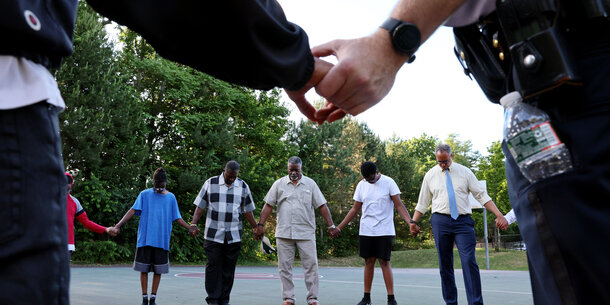Earlier this summer, New York legislators closed the books on an eventful session for criminal justice policy. Policymakers revised the state’s bail reform law for the third time in four years. Lawmakers also passed the Clean Slate Act, a bill that would automatically seal old criminal records. And in the last days of the session, the legislature passed another bill that would rewrite the state’s post-conviction laws around wrongful convictions.
Bail reform in 2019–23
To understand this year’s changes to bail and pretrial detention in New York, some context is useful. In 2019, the legislature passed a major reform ending the use of money bail and jail in most cases involving misdemeanors and lower-level felonies. It also obligated judges to impose the “least restrictive” conditions of release necessary to ensure a defendant’s return to court.
That legislation went into effect statewide on January 1, 2020, and was revised just a few months later amidst politicized concerns about rising crime. That initial round of changes expanded the circumstances in which bail could be set. Notably, the legislation authorized judges to set bail in many cases “involving harm to an identifiable person or property” if committed while released after being charged with a similar offense.
Two years later, the legislature expanded that provision, directing judges to adopt a broad definition of “harm” and raising the possibility that bail could be set in cases involving, for example, repeat shoplifting offenses. Courts continue to grapple with how to apply these changes. The 2022 amendments also laid out a list of factors that judges must consider when setting conditions of release, including criminal history.
This year, negotiations over further changes stalled the state budget for weeks. One controversial proposal would have authorized judges to set bail to address a perceived public safety risk —breaking with New York’s long-standing focus on setting only those conditions necessary to ensure return to court. Ultimately, lawmakers agreed instead to remove the provision of the 2019 legislation that required judges to set the “least restrictive” release option legally available. The impact of this change is not immediately clear. However, it could lead to judges setting bail more frequently in cases where they are authorized to do so.
For all that has changed since bail reform went into effect in 2020, much remains the same. Money bail is still not permitted for most misdemeanors and nonviolent felonies, though now with some additional carveouts related to people rearrested after release.
Automatic criminal record sealing
Late in the session, the legislature also passed the Clean Slate Act. The bill, which was refined over the last two sessions, would automatically “seal” most criminal records, effectively limiting when others (such as employers and landlords) can see them. By making record sealing broadly available, the bill aims to relieve millions of New Yorkers of the long-lasting economic and social consequences of a criminal record. If signed by the governor, New York will be the 12th state to adopt a “clean slate” law.
New York’s Clean Slate Act would automatically seal records of misdemeanors after three years and felonies after eight. But the bill comes with several carefully negotiated exclusions. Records of sex offenses and non–drug related Class A felonies will never be sealed. The waiting period resets if someone is convicted of another crime during it. Additionally, individuals must complete any community supervision (such as parole) before becoming eligible for sealing. Last, employers in some specific fields — such as law enforcement, education, and those involving work with children, elderly people, or vulnerable populations, among others — will have access to sealed records.
Over the past three years, the bill gained support from a diverse coalition, including business and labor groups, who emphasized the need to expand the state’s workforce and open up a new pool of talent for employers. Data released in the closing weeks of the session underscored those points. According to the Data Collaborative for Justice, more than 2 million New Yorkers have a criminal record, and Brennan Center research indicates these New Yorkers likely face fewer career options and severely limited economic opportunities.
Lawmakers have yet to present the bill to Gov. Kathy Hochul for her signature. Hochul championed a similar law in her 2022 State of the State policy agenda.
Relief from wrongful convictions
Last, the legislature passed the Challenging Wrongful Convictions Act, which makes it easier for people to argue in court that they were convicted of a crime they did not commit.
State law currently allows people to challenge a conviction through a process separate from an appeal that allows judges to consider new evidence and arguments that were not previously available. But that law contains no clear, statutory right to challenge a conviction based on a claim that you simply did not commit the crime of which you were convicted, known as “actual innocence.” Additionally, though all intermediate appellate courts in New York recognize a judge-made right to relief based on actual innocence, the state’s high court held in 2019 that defendants who plead guilty cannot raise such a claim, absent new DNA evidence.
The Challenging Wrongful Convictions Act addresses both issues. First, it creates a new statutory right to overturn a conviction based on actual innocence. Applicants would be required to prove “by a preponderance of the evidence” that “no reasonable jury” would have found them “guilty beyond a reasonable doubt.” Second, it makes clear that people who plead guilty may raise this argument, or any other authorized by statute, in a challenge to their conviction, expanding rights previously available only to individuals convicted after trial. In another expansion of existing law, the bill also explicitly allows courts to grant relief based on newly available forensic evidence or expert testimony that has since been undermined.
Procedurally, the bill would remove some legal hurdles defendants have historically faced in filing these challenges. And it would provide a court-appointed attorney where there is a plausible claim of relief, as well as access to evidence in the prosecutor’s files.
Like the Clean Slate Act, the Challenging Wrongful Convictions Act stalled in previous sessions, making its recent passage a momentous step. But it remains unclear whether Hochul will sign the bill.
• • •
Historically, major legislation in New York tends to pass with the state budget, in the spring. But this year some of the biggest news on criminal justice policy came at the very end of session, with two criminal justice reform bills now awaiting the governor’s signature. That is a marked contrast to the early session’s focus on revising the state’s bail laws and suggests a cautious way forward for some criminal justice reform bills.




